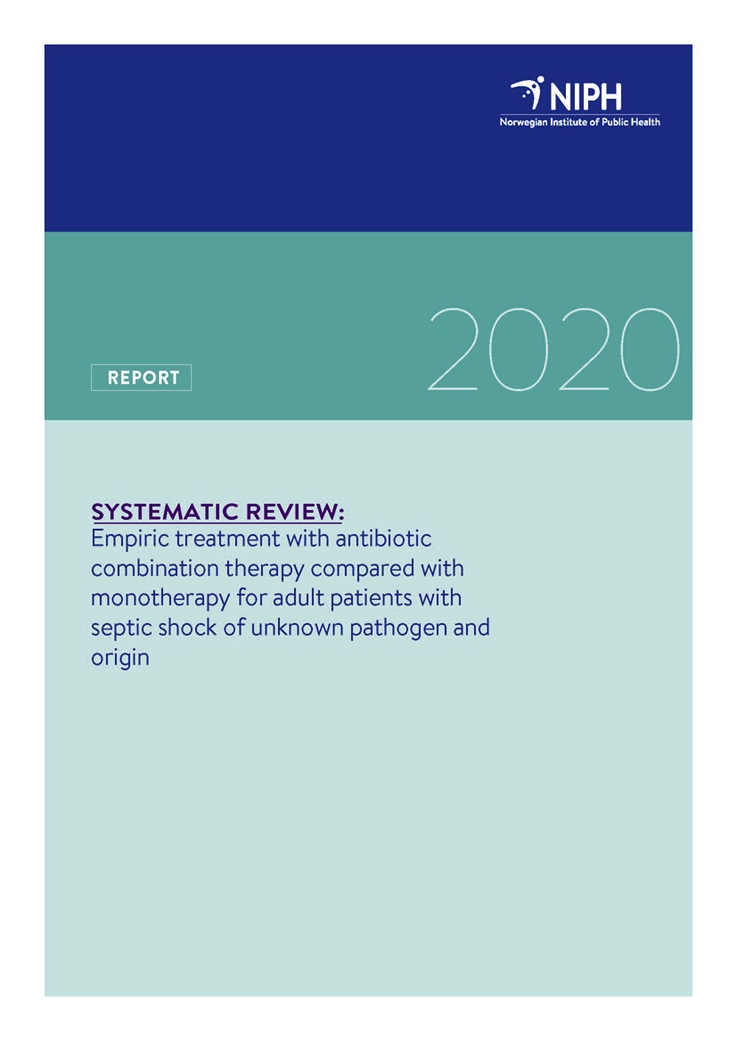Empiric treatment with antibiotic combination therapy compared with monotherapy for adult patients with septic shock of unknown pathogen and origin: a systematic review
Systematic review
|Published
The Norwegian Directorate of Health requested the Division for Health Services at the Norwegian Institute of Public Health to conduct a systematic review of effect and safety of empiric treatment with antibiotic combination therapy compared with monotherapy for adult patients with septic shock of unknown pathogen and origin.
Key message
The Norwegian Directorate of Health requested the Division for Health Services at the Norwegian Institute of Public Health to conduct a systematic review of effect and safety of empiric treatment with antibiotic combination therapy compared with monotherapy for adult patients with septic shock of unknown pathogen and origin.
We conducted a systematic review according to the protocol. Our systematic search identified 4086 references. We considered 15 of those as potentially relevant, and read them in full text.
We did not identify any studies comparing empiric antibiotic combination with monotherapy for adult patients with septic shock of unknown pathogen and origin. Therefore, we do not know if empiric treatment with antibiotic combination therapy is more effective than monotherapy for adult patients with septic shock of unknown pathogen and origin
Summary
Background
The 2013 Norwegian National Guidelines for antibiotic treatment of sepsis and septic shock has been debated due to uncertainty about the effectiveness and safety of currently recommended combination therapy. There is additional uncertainty among medical doctors in Norway about which alternative empiric antibiotic treatment is right or most plausible for adult patients suffering from septic shock of unknown origin, including possible consequences for antimicrobial resistance. Patients with septic shock must have immediate treatment, including rapid onset of antibiotic treatment. In the absence of a confirmed pathogen or clinical signs of the origin of the infection, empiric antimicrobial therapy becomes necessary. Empirical treatment is based on clinical reasoning in the absence of complete information.
As part of the preparation for an update of this guideline, the Norwegian Directorate of Health asked the Division for Health Services at the Norwegian Institute of Public Health to conduct a systematic review of available research about empiric treatment with antibiotic combination therapy compared with monotherapy for adult patients with septic shock of unknown pathogen and origin.
Objective
The objective of this systematic review is to compare the effect and safety of empiric antibiotic combination therapy with that of monotherapy for adult patients with septic shock of unknown pathogen and origin.
Method
We conducted a systematic literature search 02.12.2019 in the following databases: Medline, EMBASE, Cochrane Central Register of Controlled Trials (CENTRAL) and for planned and ongoing trials in clinicaltrials.gov and WHO ICTRP. We considered publications in Danish, English, German, Norwegian, and Swedish. Two persons independently read titles and abstracts to identify possibly relevant articles. We evaluated the relevance of selected publications based on our inclusion criteria:
Population | Adult patients with septic shock or suspected septic shock, with unknown origin of infection before start of treatment |
Intervention | Empiric antibiotic combination therapy including the following: · Macrolide + any betalactam · Genta-/tobramycin (single daily dose) + betalactam (ampicillin or (benzyl) penicillin) · Genta-/tobramycin (single daily dose) + betalactam (except ampicillin or (benzyl) penicillin) · Amikacin (single daily dose) + betalactam (ampicillin or (benzyl) penicillin) · Amikacin (single daily dose) + betalactam (except ampicillin or (benzyl) penicillin) Planned aminoglycoside treatment should include daily doses |
Comparison | Antibiotic monotherapy |
Outcomes | Mortality (30 days) Serious adverse events (including organ damage) Length of stay in hospital (days) Length of stay in ICU (days) Bacterial eradication (negative blood culture) |
Design | Prospectively controlled studies including randomized controlled trials, non-randomized controlled trials, controlled cohort studies |
Results
Of the 4086 identified references, we (two persons independently) assessed all titles and abstracts against the inclusion criteria and considered 15 as possibly relevant. We read these 15 studies in full text. None of them met the inclusion criteria. Reasons for exclusion were not relevant interventions (n=11), only abstract available (n=1), bacterial aggregated data (n=1), no primary data (n=1) and aggregated data (n=1). We excluded no studies because of language.
We did not identify any studies that compared empiric antibiotic combination therapy to that of monotherapy for adult patients with septic shock of unknown pathogen and origin.
Discussion
We did not identify published research on empiric antibiotic treatment for septic shock of unknown origin. For other patient groups there exists research on double-coverage antibiotic agents compared to monotherapy. This is reflected in the 2016 international guidelines for management of sepsis and septic shock, the foremost comprehensive evidence review of clinically relevant aspects of septic shock. This guideline reviews double-coverage antibiotic agents compared to monotherapy for septic shock collectively for origin, yet not specifically for unknown origin and unknown pathogen. We confirm with our findings that there remains a gap in available evidence.
More stratified documentation and analyses may prove useful for future research. Furthermore, our identified knowledge gap encourages new studies specifically looking at empiric treatment choices for septic shock without known origin or pathogen. A different research approach of interest may be an evaluation of local epidemiological data including resistance patterns and their possible importance for guiding empiric treatment.
Conclusion
There is an absence of published research evidence for empiric treatment with antibiotic combination therapy compared with monotherapy for adult patients with septic shock of unknown pathogen and origin. Therefore, we do not know if empiric treatment with antibiotic combination therapy is more effective than monotherapy for adult patients with septic shock of unknown pathogen and origin.


